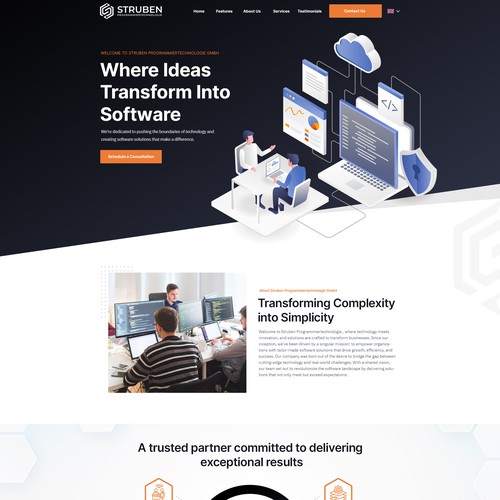The Importance of Software Application Development in the Digital Age
In today’s fast-paced and technology-driven world, software application development plays a crucial role in shaping the way businesses operate and interact with their customers. From mobile apps to enterprise solutions, software applications have become essential tools for enhancing productivity, streamlining processes, and driving innovation.
Key Stages of Software Application Development
Software application development typically involves several key stages:
- Planning: This stage involves defining the project scope, requirements gathering, and creating a roadmap for development.
- Design: Designers create wireframes and mockups to visualize the user interface and user experience of the application.
- Development: Developers write code to build the functionality of the application based on the design specifications.
- Testing: Quality assurance testers conduct rigorous testing to identify and fix bugs or issues in the application.
- Deployment: The final stage involves deploying the application to production environments for users to access.
The Benefits of Custom Software Applications
Custom software applications offer numerous benefits for businesses, including:
- Tailored Solutions: Custom applications are designed to meet specific business needs and requirements, providing a competitive edge.
- Scalability: Custom applications can be easily scaled as businesses grow and evolve.
- Better Integration: Custom applications can be integrated with existing systems and technologies seamlessly.
- Data Security: Custom applications offer enhanced data security measures tailored to the unique needs of a business.
The Future of Software Application Development
As technology continues to advance rapidly, the future of software application development holds exciting possibilities. Trends such as artificial intelligence, machine learning, cloud computing, and Internet of Things (IoT) are shaping the next generation of innovative applications that will revolutionize how businesses operate and engage with their customers.
In conclusion, software application development is a driving force behind digital transformation and business success in today’s interconnected world. By investing in custom software solutions tailored to their needs, businesses can stay ahead of the curve and achieve sustainable growth in an increasingly competitive market landscape.
Essential Tips for Effective Software Application Development
- Follow best coding practices to write clean and maintainable code.
- Regularly test your code to ensure its functionality and performance.
- Utilize version control systems like Git to manage and track changes in your codebase.
- Document your code thoroughly for easier maintenance and future reference.
- Consider security measures to protect the application from vulnerabilities and attacks.
- Collaborate with team members, gather feedback, and continuously improve the application.
Follow best coding practices to write clean and maintainable code.
Following best coding practices is essential in software application development to ensure that the code is clean and maintainable. By adhering to established coding standards and guidelines, developers can write code that is easier to read, understand, and modify. Clean code not only improves the overall quality of the software but also enhances collaboration among team members working on the project. Additionally, maintainable code reduces the time and effort required for future updates and enhancements, ultimately leading to a more efficient development process and a better end product.
Regularly test your code to ensure its functionality and performance.
Regularly testing your code is a critical aspect of software application development to ensure both its functionality and performance. By conducting thorough testing procedures, developers can identify and rectify any bugs or issues early in the development process, leading to a more stable and reliable final product. Testing also helps optimize the performance of the application, ensuring that it meets user expectations and operates efficiently across different platforms and environments. Prioritizing regular testing not only enhances the quality of the software but also contributes to a seamless user experience and overall success of the application.
Utilize version control systems like Git to manage and track changes in your codebase.
Utilizing version control systems like Git is essential in software application development to effectively manage and track changes in your codebase. By using Git, developers can collaborate seamlessly, track modifications made to the code, revert to previous versions if needed, and maintain a complete history of the project’s development. This ensures better organization, transparency, and efficiency throughout the software development process, enabling teams to work cohesively and maintain code integrity.
Document your code thoroughly for easier maintenance and future reference.
Documenting your code thoroughly is a critical tip in software application development as it ensures easier maintenance and future reference. By providing clear and detailed comments within the codebase, developers can easily understand the functionality, purpose, and logic behind each section of code. This practice not only facilitates collaboration among team members but also simplifies troubleshooting and debugging processes in the future. Well-documented code serves as a valuable resource for both current and future developers, enabling them to make modifications or enhancements with confidence and efficiency.
Consider security measures to protect the application from vulnerabilities and attacks.
When embarking on software application development, it is crucial to consider security measures to safeguard the application from vulnerabilities and potential cyber attacks. Implementing robust security protocols helps protect sensitive data, prevent unauthorized access, and ensure the integrity of the application. By prioritizing security during the development process, developers can mitigate risks and build trust with users by providing a secure and reliable software solution.
Collaborate with team members, gather feedback, and continuously improve the application.
To enhance the effectiveness of software application development, it is crucial to foster collaboration among team members, gather valuable feedback from stakeholders, and prioritize continuous improvement initiatives. By working together, sharing insights, and incorporating feedback throughout the development process, teams can ensure that the application meets user needs, addresses potential issues proactively, and evolves to deliver optimal performance and user experience over time. This iterative approach not only enhances the quality of the application but also fosters a culture of innovation and adaptability within the development team.




